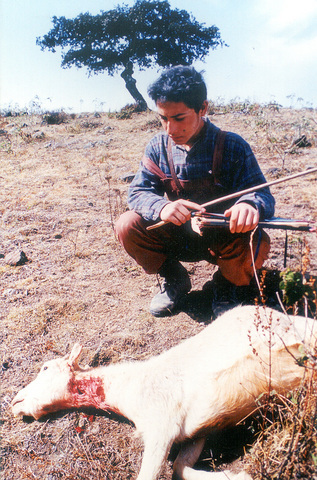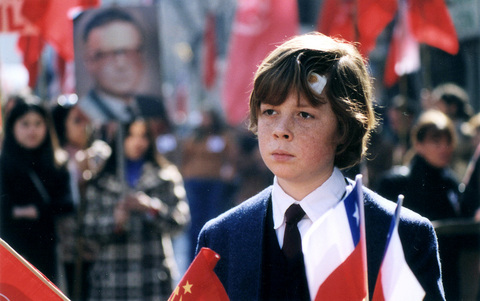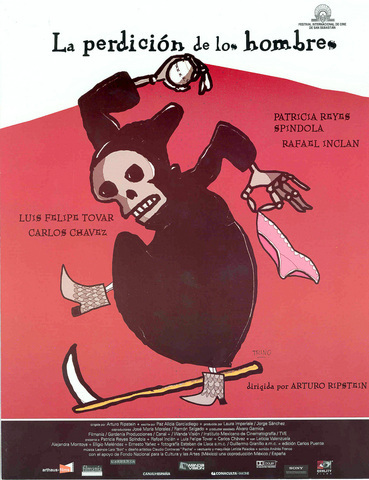After the Taipei Golden Horse International Film Festival wrapped up this week, this year's film festival season will enjoy another boost with the arrival of the Latino American Film Festival (拉丁美洲影展).
Featuring 24 movies from across the continent, the festival opens up a window for audiences to see different aspects of Latin America other than Argentina's tango or Brazil's football team.
The festival, which started yesterday, will run to the new year and will stop off at four venues nationwide: SPOT -- Taipei Film House

PHOTO COURTESY OF SPOT
As festival programmer Chang Chu-ti (
Arturo Ripstein, the director in focus, was born in Mexico City in 1943. Ripstein started his film career at the age of 19, working as an assistant director for Luis Bunuel on The Exterminating Angel (1962). In many of his films, the director explores the solitude of the human soul with a surrealistic bent, an aesthetic approach that has earned him a name as the successor of Bunuel, the cinema master of surrealism.
Adapted from the screenplay by Gabriel Garcia Marquez and Carlos Fuentes, Ripstein's directorial debut, Time to Die, initiated the director's long-term collaboration with the Latin American authors. The Realm of Fortune is based on Mexico writer Juan Rulfo's story about a poor peasant who gains wealth by raising gamecocks and loses his fortune when life takes an unexpected turn.

PHOTO COURTESY OF SPOT
Devine presents the story of a teenage girl named Tomasa who is chosen to give birth to the New Messiah by the leader of the New Jerusalem cult. Unable to handle the power and pressure, Tomasa declares herself the Whore of Babylon and makes male followers have sex with her.
The Ruination of Men tells a bizarre tale that begins with two peasants murdering a man who has two wives. After taking the body home, the murderers find themselves trapped in an eerie situation in which the dead man's wives refuse to share their deceased husband and fight over the corpse.
The program "Nouvelle Vague of Latino Cinema" introduces a bevy of talented filmmakers who strive to combat the cultural hegemony of Hollywood.

PHOTO COURTESY OF SPOT
Movie, Aspirin and Vultures follows two men, a German and a Brazilian, who travel through the backside in Brazil. They show a film to the locals, who have never seen cinema before, in an attempt to convince the peasants that the medicine they are hawking is the real deal.
Lost Embrace deals with the issues of immigration and identity. Set in the capital of Argentina where many young people want to find their ancestors' roots and obtain a foreign passport, the character Ariel wants to go back to Poland and to discover why his father abandoned the family to fight a war in Israel.
For those who have missed the cream of Latino cinema in recent years, the festival also offers a chance to review selected works on the big screen. Buena Vista Social Club and Musica Cubana trace the history of Cuban music and put the legendary musicians in the international spotlight. The Motorcycle Diaries by Walter Salles follows the road trip through South America made by a young Che Guevara who is later inspired to become a revolutionary. City of God is a well regarded violent gang flick that made Brazilian director Fernando Meirelles internationally famous overnight.

PHOTO COURTESY OF SPOT
Tickets are available from www.artsticket.com.tw. For detailed information on films and screening times visit www.twfilm.org/Latino/index.html.
Festival Notes:
What: Latino America Film Festival

PHOTO COURTESY OF SPOT
When and Where:
Nov. 17 to Nov. 28, 2005, at SPOT -- Taipei Film House: 18, Zhongshan N Rd Sec 2, Taipei (台北市中山北路二段18號).
Nov. 29 to Dec. 4 at Taichung Universal Cinema City: 1-1, Zhonghua Rd Sec 1, Taichung (台中市中華路一段1-1號)
Dec. 6 to Dec. 18 at Kaohsiung Film Archive: 10 Hesi Rd, Yencheng district, Kaohsiung County (高雄縣鹽埕區河西路10號).
Dec. 21 to Jan. 1, 2006, at Hsinchu Municipal Image Museum: 65, Chungcheng Rd, Hsinchu City (新竹市中正路65號).
Tickets: NT$180 for members, NT$200 for non-members at SPOT -- Taipei Film House. NT$100 in Hsinchu. Entrance is free of charge in Kaohsiung.

Behind a car repair business on a nondescript Thai street are the cherished pets of a rising TikTok animal influencer: two lions and a 200-kilogram lion-tiger hybrid called “Big George.” Lion ownership is legal in Thailand, and Tharnuwarht Plengkemratch is an enthusiastic advocate, posting updates on his feline companions to nearly three million followers. “They’re playful and affectionate, just like dogs or cats,” he said from inside their cage complex at his home in the northern city of Chiang Mai. Thailand’s captive lion population has exploded in recent years, with nearly 500 registered in zoos, breeding farms, petting cafes and homes. Experts warn the

No one saw it coming. Everyone — including the Chinese Nationalist Party (KMT) — expected at least some of the recall campaigns against 24 of its lawmakers and Hsinchu Mayor Ann Kao (高虹安) to succeed. Underground gamblers reportedly expected between five and eight lawmakers to lose their jobs. All of this analysis made sense, but contained a fatal flaw. The record of the recall campaigns, the collapse of the KMT-led recalls, and polling data all pointed to enthusiastic high turnout in support of the recall campaigns, and that those against the recalls were unenthusiastic and far less likely to vote. That

The unexpected collapse of the recall campaigns is being viewed through many lenses, most of them skewed and self-absorbed. The international media unsurprisingly focuses on what they perceive as the message that Taiwanese voters were sending in the failure of the mass recall, especially to China, the US and to friendly Western nations. This made some sense prior to early last month. One of the main arguments used by recall campaigners for recalling Chinese Nationalist Party (KMT) lawmakers was that they were too pro-China, and by extension not to be trusted with defending the nation. Also by extension, that argument could be

Aug. 4 to Aug. 10 When Coca-Cola finally pushed its way into Taiwan’s market in 1968, it allegedly vowed to wipe out its major domestic rival Hey Song within five years. But Hey Song, which began as a manual operation in a family cow shed in 1925, had proven its resilience, surviving numerous setbacks — including the loss of autonomy and nearly all its assets due to the Japanese colonial government’s wartime economic policy. By the 1960s, Hey Song had risen to the top of Taiwan’s beverage industry. This success was driven not only by president Chang Wen-chi’s